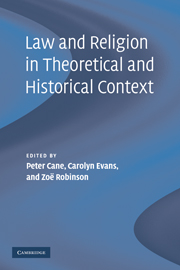Book contents
- Frontmatter
- Contents
- List of Contributors
- 1 Introduction
- 2 The moral economy of religious freedom
- 3 Understanding the religion in freedom of religion
- 4 Why religion belongs in the private sphere, not the public square
- 5 Pluralism in law and religion
- 6 The influence of cultural conflict on the jurisprudence of the religion clauses of the First Amendment
- 7 From Dayton to Dover: the legacy of the Scopes Trial
- 8 A very English affair: establishment and human rights in an organic constitution
- 9 Days of rest in multicultural societies: private, public, separate?
- 10 Australian legal procedures and the protection of secret Aboriginal spiritual beliefs: a fundamental conflict
- 11 Secular and religious conscientious exemptions: between tolerance and equality
- 12 Law's sacred and secular subjects
- 13 Freedom of religion and the European Convention on Human Rights: approaches, trends and tensions
- Index
- References
11 - Secular and religious conscientious exemptions: between tolerance and equality
Published online by Cambridge University Press: 07 July 2009
- Frontmatter
- Contents
- List of Contributors
- 1 Introduction
- 2 The moral economy of religious freedom
- 3 Understanding the religion in freedom of religion
- 4 Why religion belongs in the private sphere, not the public square
- 5 Pluralism in law and religion
- 6 The influence of cultural conflict on the jurisprudence of the religion clauses of the First Amendment
- 7 From Dayton to Dover: the legacy of the Scopes Trial
- 8 A very English affair: establishment and human rights in an organic constitution
- 9 Days of rest in multicultural societies: private, public, separate?
- 10 Australian legal procedures and the protection of secret Aboriginal spiritual beliefs: a fundamental conflict
- 11 Secular and religious conscientious exemptions: between tolerance and equality
- 12 Law's sacred and secular subjects
- 13 Freedom of religion and the European Convention on Human Rights: approaches, trends and tensions
- Index
- References
Summary
Introduction
The main argument of this paper is that conscientious exemptions, whether religious or non-religious ones, are better understood as the outcome of tolerance than as a way of applying the principle of equality.
This argument can be read in two different ways. Firstly, it is an analytical argument according to which almost all cases of conscientious exemptions, and surely all central and paradigmatic cases fall within the scope of the principle of tolerance, as I understand the concept. Secondly, not only is tolerance the best way to describe our attitude when we grant conscientious exemptions but in many cases tolerance is also the desirable moral basis for it. This is a normative argument that complements the analytical one. The following discussion will focus on the analytical argument but will also refer to the normative one although without putting forward a detailed reasoning for the latter.
This argument calls for three preliminary notes. The first is about the scope of the concept of ‘conscientious exemptions’. The second is needed for explaining how this paper's argument applies in similar strength both to religious and non-religious conscientious exemptions and the third explains why this argument matters.
The scope of the concept of ‘conscientious exemption’
Granting conscientious exemption is merely one of many ways of protecting freedom of conscience and religion. It is also merely one of many kinds of exemptions that can be granted from the demands of the law.
- Type
- Chapter
- Information
- Law and Religion in Theoretical and Historical Context , pp. 243 - 267Publisher: Cambridge University PressPrint publication year: 2008
References
- 4
- Cited by

